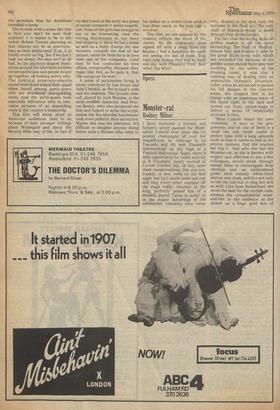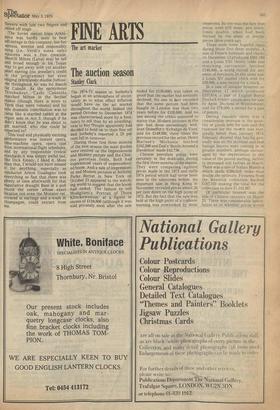pera
Monster -rat
Rodney Milnes
I have nurtured a fervent and hitherto secret passion for Montserrat Caballe ever since she (a) poured champagne all over her magnificent, er, cleavage in La Traviata an.d (b) sent Elisabeth Schwarzkopf up sky high at a Festival Hall recital, Sadly, there is little opportunity for either activity in /I Trovatore, newly revived at Covent Garden, but, oh boy, were there compensations. She was not, frankly, in best voice on the first night, but La Caballe under par can still sing every other soprano off the stage today, whether in the long, perfectly poised line of a sensibly paced `Tacea la notte' or in the insane skitterings of the subsequent cabaletta (one verse only, shame) or the duet with the baritone in the final act. The very stuff of drama-in-music is eased through that divine larynx.
The fact that her acting lacks all artifice makes it all the more entrancing. The flash of Mediterranean fury and disdain (I refer to her great black eyes) with which she rewarded the baritone in the garden scene should have sent him scuttling for the safety of his dressing room; it was also a cunning way of dealing with an impossible dramatic situation. Later, when he advanced to pursue his fell designs in the convent' scene, she stopped him in his tracks with an imperious wave of the hand right in his face and turned out front, centre-stage to deliver a series of impeccably accurate B flats.
"Mme Caballe wears her own costumes," it says in the programme, and on one of them is "a cloak she can swish round in perfect time with a long upwards scale so that it comes to rest at the precise moment that she reaches her top C. And who else but the Monster-rat, as she is known with respect and affection to not a few colleagues, would sneak through enemy lines in extravagant drop earrings and an embroidered gown with outsize white-lined sleeves and cloak, and live not only to tell the tale but to sing her aria as well? Like Joan Sutherland, she saves the best for the curtain calls, witness the conspiratorial winkand-leer to .the audience as she picked up a huge gold box of flowers with just two fingers and sailed off stage.
The Soviet mezzo Irina Arkhipova was hardly seen to best advantage in this company, but her serious, interior and responsibly sung (i.e. Verdi's notes only) Azucena was a fine creation. Sherrill Milnes (Luna) may be tall and broad enough in his Texan Way to get away with yet another pearl earring (no jeweller's credit ifl. the programme) but even singing relentlessly double fortissinlo throughout he was no match for Caballe. As the eponymous Troubadour, Carlo Cossutta matched Milnes in the decibel stakes (though there is more to Verdi than mere volume) and his Sole dramatic contribution was to Jump like a startled rabbit at the organ solo in Act 3, though if he didn't know that he was about to get married, who else could be expected to?
This loud and physically exciting Performance was instant opera, time-machine opera, opera cast from international flight schedules, and by any responsible critical standards it was simply awful but, like Dick Emery, I liked it. More than that, I would not have missed It for anything, especially as conductor Anton Guadagno took everything so fast that there was Plenty of time afterwards for that superlative draught Bass in a pub round the corner whose exact location not even the Monster-rat, covered in earrings and a-wash in champagne, could extract from me.



































 Previous page
Previous page